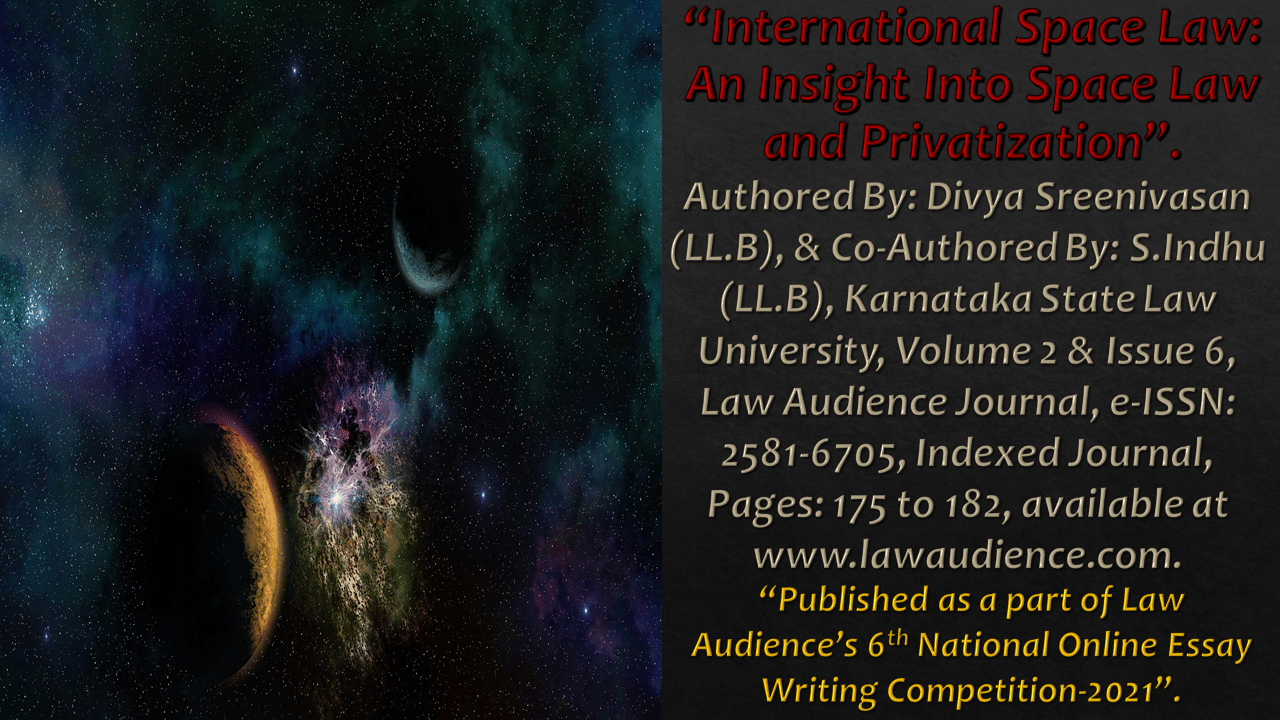Click here to download the full paper (PDF)
Authored By: Divya Sreenivasan (LL.B), & Co-Authored By: S.Indhu (LL.B), Karnataka State Law University,
Click here for Copyright Policy.
I. INTRODUCTION:
“Space law, a new yet necessitated stream of law for the future to regulate space activities. Space law can be simplified as the body of laws that governs space-related activities. Unlike other laws and statutes, space law is not a codified means in the various Nationals. It is a conglomeration of international agreements, conventions, treaties, United Nations General Assemblies regulations, etc, One cannot confine space law into national legislations it is a part of International Law. The synergy between world leaders is the means to regulate space law activities”.
Keywords: Space Law, ISRO, Multidimensional, Cosmic Environment, Space Activities, Exploration, Private Entities, Personal Competence, Launch Contracts, Space Policy, Space Activities Bill, Space Operation, Space Application.
II. SPACE LAW – MEANING:
Space law to be precise governs space-related activities done by world nations and regulates the competitions among different nations. It also regulates the activities of private players in space, to maximize government interference and avoid the monopoly of private players. Human activities in outer space are also ascertained by the regulations. Space law is a wider stream and multidimensional. The major issues related to space are setting up rules for exploration of the cosmos, avoiding armaments in space, legal liability for damages in space activities, recording various space activities, space environmental issues, and rescuing astronauts who are in distress. These are some of the major areas that are regulated by space law.
The role of Space lawyers is significant. Space Lawyers draft international treaties and agreements governing Space laws. Space Lawyers of various nations advise whether to entertain a particular international covenant of space law. Apart from these, lawyers negotiate agreements, engage themselves in policymaking, and help the government to understand various aspects of space law to comply. Space lawyers and counsels get to understand cosmic science better, to help interpret it easier to the government and with private entities.
III. SPACE LAW, ITS JURISDICTION:
Jurisdiction in Space Law is a dynamic pathway. Conventionally, every state exercises its territorial jurisdiction. Territorial Jurisdiction governs human activities over a particular territory. Territorial Jurisdiction governs the laws of people bound within a territory. The activities of humans are controlled by territorial laws under territorial jurisdiction. If a person belongs to INDIA, the laws of India govern the activities of the person. Apart from territorial jurisdiction, the personal competence of people is also taken into account in certain cases to determine the law of State to govern the person. This jurisdiction falls outside the scope of territorial limits and the personal competence of the person is taken into consideration to determine the jurisdiction. In international waters, the moon, space where territorial limits do not apply personal competence of persons come into play to determine the law to govern the human activities under such environment. There exists no environment where there is no law. Either personal competence or territorial jurisdiction applies to activities of people in a particular geography inclusive of space activities.
To illustrate, if a French woman walks on the Moon, her activities on the moon would be governed under personal competence i.e., under French law. Laws involving Nations Spacecraft, astronauts, Space debris are governed by the nation’s space laws. If it involves more than one nation, international space law takes effect and has its means of regulation to solve the dispute. Lawyers practicing in the stream of space law are highly needed to govern both the national and international disputes involving human activities in the cosmos.
IV. NATION’S ADVANCEMENT IN SPACE LAW:
Every country has its legislature that governs Space Activities. Each country has its approach and ways to constitute Space laws. National Space Legislations are presented in amalgamated codes in the legal architecture of Nations. Certain Nations have a modified approach towards the setting up of the legal structure of Space laws based on their mandates and considerations, like the involvement of Non-Governmental Organizations or Private players. Legal structures are constituted to regulate space activities like the launch of objects into space, re-entry of objects from space, operation site for launch & re-entry, operation & control of objects orbiting space, manufacturing of space crafts, space exploration, research activities in space, etc., Recently we can find an increase in the participation of NGOs & private players in Space activities, which makes it pivotal for the governments to supervise and regulate space activities with legislation.
V. SPACE LAW: ITS PROVISIONS:
Many provisions for regulation of space law have been included in the legislation of nations. Few regulations and provisions have been mentioned above. Apart from the said provisions, various other regulatory statutes are inclusive of space law. There are also Launch Contracts, contracts inclusive of provisions of space law activities. There exist several Rules in National Laws that govern space activities. National Law also creates provisions to organize and regulate space agencies.
The cosmic environment is highly perilous. The environment is uncertain and has huge risk factors for both public and private players. The public space law surmounts Nations to incorporate liabilities on their space activities and take responsibility for the damages if occurred. On considering private law and private space agencies, they ensure contracts entered have special contracts that enforce liabilities and control over space activities performed by private players.
Concerning cosmic activities, it dominates Earth. Unique and controlled strategies are required to monitor space research and other operations in space. The outer space ecosystem is highly different and unforeseeable. This unpredictable environment necessitates the nations to control and regulate various human activities and research operations done in space. Treaties confer powers on countries to explore space and to regulate space activities. These treaties provide freedom to conduct space exploration. This freedom is under strict regimen when it comes to private space agencies and NGOs. Private parties and NGOs do not have freedom akin to nations on space exploration. Strict responsibility endowed upon private players. They require post-authorization and the State continuously engages in surveillance of the private parties involved in space exploration.
Various innovations in Space technology have depreciated the dangerousness of space activity which in turn normalized space law legislation concerning private players. Innovation in space technology and the involvement of various private space agencies will shift the State legislation into more private-friendly statutes to bring about more technological resources through private parties and NGOs.
VI. SPACE LAW REFORMS:
Commercialization and privatization of space exploration, a very promising and unprecedented level of investment from various private entities towards the development of satellite technology, upgraded space vehicles, the emergence of spaceports, launch vehicles, space defense system, and scientific exploration is very promising towards the future of space exploration which leads to the advancement of space law legislation and more involvement of space lawyers. These new developments into space exploration and space technology are a welcome reign in the field of space activities. But it is unclear whether the new development by private players is on par with International Space law or any other Space Law relations in general.
The new reform should be emphasizing on the sacrosanct nature of the Non-appropriation rule for outer space to be binding upon private players and NGOs. The private players would swarm more in the future of Space Activities, it should be the duty of every nation to restrict these private entities from territorial control of the outer space environment and exploitation of finite resources of the space ecosystem. Is it to be noted that jurisprudential interpretation and the interpretation of international commerce apply to the resources and activities played away from the Earth. In India, Space research is pivotal and various space programs are been conducted by ISRO. Space programs in India are increasing and it is the right juncture to develop space legislation. The Space policy and Space Activities Bill are in the final stages of legislation in India. A complete constitution of Space policies and Space law is under work and will be made into law shortly. The new privatization policies of the government and the willingness of private business entities in India to invest in Space exploration have led the government to new traction to formulate space law for the future.
New government policy has allowed the participation of Private Entities into investment in various space activities like the manufacture of rockets, satellite production, and construction of launch vehicles. In a trice, new laws and a structured system for space activities will be present in India to enhance the active participation of private players without any hindrance. The new investment will increase innovation in space technology in India and will drive the competition of India to the world players forward. The proposed Space policy and Space Activities Bill will resolve legal issues arising out of Space law Activities and regulate the private entities willing to invest in space activities. The changes anticipated in Remote Sensing Data Policy and SATCOM are also on the anvil which would also bring about regulations in space activities in India.
VII. SPACE LAW AND PRIVATISATION IN INDIA:
Space activity in India is performed entirely by the Union government. No player entities have been involved in any form of space research. Unlike other sectors, Space Sector is directly monitored and governed by Prime Ministers Office [PMO]. The government controls the Space sector in India. The space market is devoid of any private players until recently. ISRO plays the role of the space agency in India and they are a huge stride among the world competitors. Among world nations competing in space power and technology India is also considered a superpower and has various outweighing technology in space drives.
World powers like United States, Russia, China, and France have privatized their space markets and are having exponential returns in the space domain. Indian Space research program began in the year 1962 and was called Indian National Committee for Space Research which evolved itself into a more potential organization currently called ISRO [Indian Space Research Organization]. Recently, the Space market of India has transitioned itself from a controlled conditional environment into an open sector allowing the participation of private players in investment. For the past few years, many private entities have incorporated themselves into the juncture of Space technology and other related space activities. Unfortunately, there exist no regulations nor legislation governing commercial space activities opened up in the Indian Space Market.
Currently, the Indian Government has provided various regulations governing commercial Space activities, investments into space technology by corporations, etc but there exists no robust framework to control and manage commercial space activity in India.
To address these barriers in Commercial Space Activities, DOS has published a draft Space Activities Bill for consultation in the year 2017. This bill is endowed to regulate private participation, controlling their activities in a certain area yet increasing their participation in space technological investments.
VIII. AMBIT & SCOPE OF SPACE LAW:
Predominantly space law applies to the activities concerning outer space. There exists no strict explanation nor definition neither scientific nor legal in explaining Space law. It’s a multifaceted stream. To differentiate the expanse of the field, the Supply Contract for supplying parts to be utilized for going outer space appears to be just a simple supply contract at the instance it does not appear to be a space law. But in reality, it is considered to be a space law activity because it concerns supply parts for space activity, unlike the automobile part. This supply contract would also contain exemption and regulatory clauses that govern space regulations both nationally and internationally.
Space law is a diverse field involving varieties of activities that is related to and is concerned about outer space. Unlike a simple supply contract, it enters as a Special Law Category into the provisions of Space Law. Space activities cannot be delimited only to outer space operations. It includes activities performed on land, in space, on pieces of equipment used in outer space, etc. Curtailment of space law degrades the purpose of regulations. Nations control all activities set out in the cosmos by Outer Space treaties, it does not concern the person who engages them. It is not like private trade agreements and application, though private parties enter into space operations nations play the role of governance and liabilities.
It is necessary to distinguish “space operation” from “space application”. To give an example, activities like launching a satellite, modifying its orbit, or emitting it into outer space connected with “space operation”. As contrasted to the former, space application includes using a GPS in a car, receiving signals for TV telecast, etc. State’s control is exclusively into space operation rather than the space application. Space applications can move freely in their operation. There exists an obligatory mandate of the State over Space operation to control and supervise outer space activities.
IX. CONCLUSION:
To explore the universe and its phenomena conducted for the benefit of every nation despite the state of economic or scientific development a nation is persisting. The region beyond the Earth’s atmosphere is vast and the exploration of celestial bodies would benefit every being. Space is not a province of one nation, it is a province for every mankind.
There exists freedom and cooperation between every nation in exploring the cosmos, studying cosmic activities, observing celestial bodies & conducting scientific research.
No law restricts a man from exploring space. The resources and the knowledge gained from space activities are to be shared and relished by every humankind. To conclude, studying space is the future of human enlightenment. Space law governs and regulates space activities to restrict people from owning space and to make it available for every mankind. Every Nation has to facilitate peaceful cooperation of space activities and to make avail the benefits for all human being.
References:
- Henri, Yvon. “Orbit Spectrum Allocation Procedures ITU Registration Mechanism” (PDF). International Telecommunications Union.
- “Committee on the Peaceful Uses of Outer Space and its Subcommittees”. United Nations Office for Outer Space Affairs.
- “United Nations Office for Outer Space Affairs”. Archived from the original on 16 December 2018.
- Fountain, L. (2003). Creating the Momentum in Space: Ending the Paralysis Produced by the “Common Heritage of Mankind” Doctrine, Connecticut Law Review.
- Jankowitsch, Peter (2003). “Space Ethics and Protection of the Space Environment”.
- “Space, Cyber, and Telecommunications Law | University of Nebraska–Lincoln”. Spaceandtelecomlaw.unl.edu.
- Lee, K. (1994) Awe and humility: intrinsic value in nature – beyond an earthbound environmental ethics, in: Attfield, R. & Belsey, A. Philosophy and the Natural Environment, Cambridge: Cambridge University Press
- “Law Graduation Includes First-Time Certificate in Space Law”.
- Kopal, V. The Life and Work of Professor Vladimir Mandl – A Pioneer of Space Law. New Perspectives of Space Law – Proceedings of the 53rd IISL Colloquium on The Law of Outer Space. Paris: International Institute of Space Law, 2011.
Cite this article as:
Divya Sreenivasan & S.Indhu, International Space Law: An Insight Into Space Law and Privatization, Vol.2 & Issue 6, Law Audience Journal, Pages 175 to 182 (27th June 2021), available at https://www.lawaudience.com/international-space-law-an-insight-into-space-law-and-privatization/.



